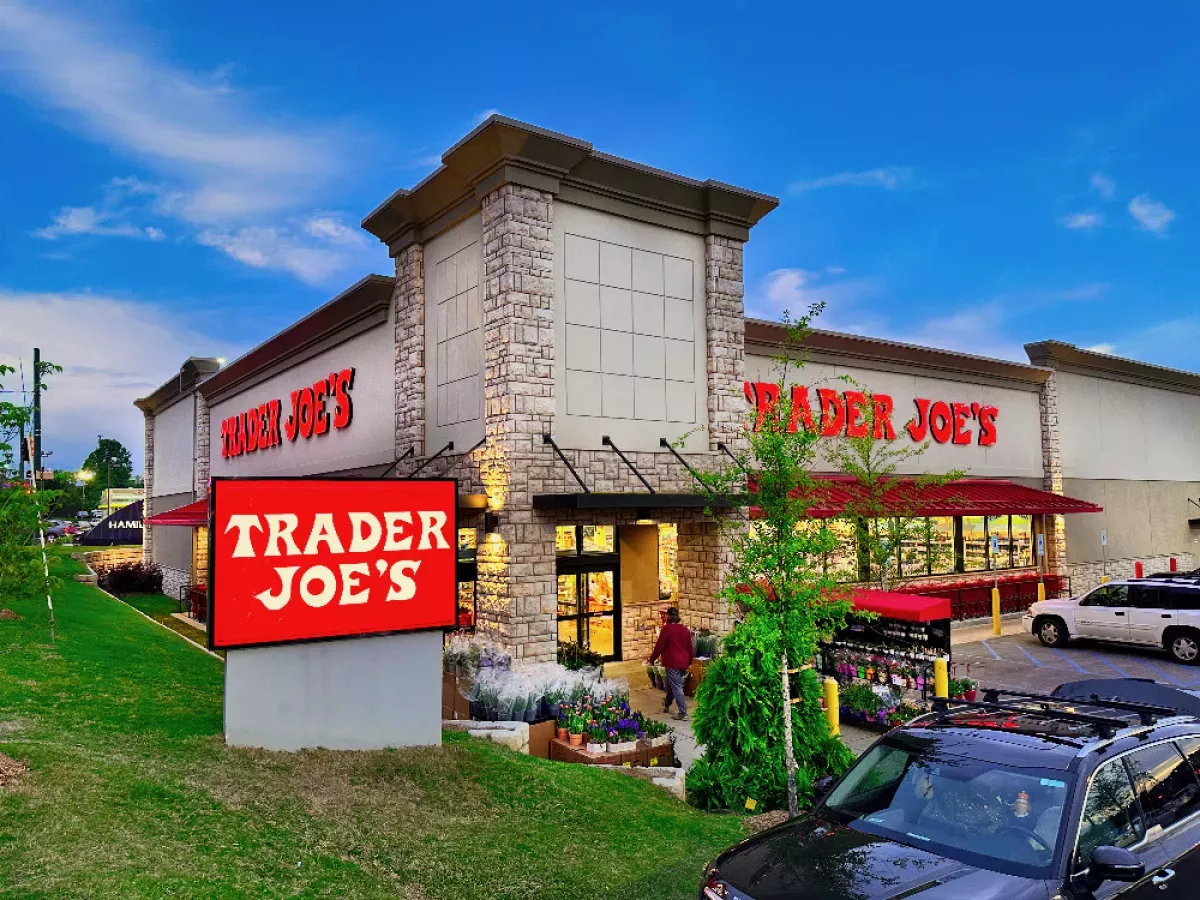Trader Joe's is a unique American grocery store chain known for its affordable and distinctive private-label products. With nearly 600 stores nationwide, it has cultivated a loyal following through its focus on value, interesting food items, and a quirky, customer-friendly atmosphere. Trader Joe's distinguishes itself from traditional supermarkets through its smaller store format, limited selection of products (mostly private label), and lack of sales or loyalty programs. The company's success is rooted in its ability to source unique and appealing products at competitive prices, offering a treasure hunt experience for shoppers.
1955: Trader Vic's Opens in Beverly Hills
In 1955, Trader Vic's, the famous tiki-themed restaurant, opened its first Southern California location in the Beverly Hilton and would later inspire the name Trader Joe's.
1958: Pronto Market stores Begin
In 1958, Joe Coulombe started a chain of Greater Los Angeles area known as Pronto Market convenience stores, the predecessor to Trader Joe's.
1967: First Trader Joe's Store Opens
In 1967, the first Trader Joe's store was opened by Joe Coulombe in Pasadena, California.
1970: Anticipation of International Travel Growth
In 1970, Trader Joe's anticipated that the premiere of new jumbo jets would accelerate international travel and influence the merchandising of the new store concept.
1977: Introduction of International-Sounding Brand Variants
In 1977, Trader Joe's began introducing international-sounding variants of its brand for some of its private label ethnic food items, such as "Trader José", "Trader Joe San", and "Trader Giotto".
1979: Aldi Nord Buys the Company
In 1979, Theo Albrecht, owner and CEO of Aldi Nord, bought Trader Joe's as a personal investment for his family.
1979: Aldi Buys Trader Joe's
In 1979, the Trader Joe's chain was sold to Aldi founder Theo Albrecht.
1987: John V. Shields Becomes CEO
In 1987, John V. Shields, Joe Coulombe's Stanford roommate, succeeded him as CEO of Trader Joe's.
1990: Store Expansion
In 1990, Trader Joe's continued its expansion by quintupling its number of stores between 1990 and 2001 and increased its profits tenfold.
1993: Expansion into Arizona
In 1993, under the leadership of John V. Shields, Trader Joe's expanded into Arizona.
1996: First East Coast Stores Open
In 1996, Trader Joe's opened its first stores on the East Coast in Brookline and Cambridge, both outside Boston.
1997: Home Value Growth Near Trader Joe's
Starting in 1997, Zillow found that homes grew more rapidly in value if they were closer to a Trader Joe's or Whole Foods.
2001: Dan Bane Succeeds Shields as CEO
In 2001, Dan Bane succeeded John V. Shields as CEO of Trader Joe's.
2001: Profits Increase Tenfold
In 2001, Trader Joe's increased its profits tenfold between 1990 and 2001.
2004: BusinessWeek Reports Store Increase
In 2004, BusinessWeek reported that Trader Joe's quintupled its number of stores between 1990 and 2001, and increased its profits tenfold.
February 2008: Highest Sales Per Square Foot
In February 2008, BusinessWeek reported that Trader Joe's had the highest sales per square foot of any grocer in the United States.
February 2008: Phase Out of Single-Ingredient Products From China
In February 2008, Trader Joe's announced that it would phase out single-ingredient products from China by April 2008, because of unspecified customer concerns.
April 2008: Phasing Out Single-Ingredient Products From China
In April 2008, Trader Joe's phased out single-ingredient products from China due to unspecified customer concerns.
2008: Ethisphere's Most Ethical Companies
From 2008 to 2010, Ethisphere magazine listed Trader Joe's among its most ethical companies in the United States.
May 2009: Consumer Reports Ranking
In May 2009, Consumer Reports ranked Trader Joe's the second-best supermarket chain in the United States.
June 2009: MSN Money Customer Service Ranking
In June 2009, MSN Money released its annual Customer Service Hall of Fame survey results, in which Trader Joe's ranked second in customer service.
2010: Ethisphere's Most Ethical Companies
From 2008 to 2010, Ethisphere magazine listed Trader Joe's among its most ethical companies in the United States.
2010: Ownership Passes to Heirs
In 2010, ownership of Trader Joe's passed to the heirs of Theo Albrecht after his death.
2011: Ethisphere Ranking
In 2011, Trader Joe's did not make the list of Ethisphere magazine's most ethical companies in the United States.
2012: Greenpeace Ranking
In 2012, Trader Joe's was ranked 15th on Greenpeace's CATO (Carting Away the Oceans) scale.
September 2013: Changes to Employee Medical Insurance
In September 2013, Trader Joe's announced that part-time employees would need to work an average of 30 hours per week to qualify for medical insurance due to the Affordable Care Act (ACA). Employees not qualifying for insurance were made eligible for ACA plans.
2013: Greenpeace Ranking improved to third
In 2013, Trader Joe's improved its ranking to third on Greenpeace's CATO scale by removing six unsustainable species of fish and getting involved in efforts to protect the Bering Sea Canyons.
2014: Consumer Reports Ranking
In 2014, Consumer Reports again ranked Trader Joe's a top-scoring supermarket chain.
2014: Portland Store Plans Halted
In 2014, Trader Joe's agreed to halt plans to open a store in a historically black neighborhood in Portland, Oregon, following protests led by the Portland African American Leadership Forum.
2015: Natural Grocers to be Built
In 2015, along with a proposal to build new affordable housing, the city announced that a different store, Natural Grocers, would be built on the vacant lot originally planned for Trader Joe's.
February 2016: Cage-Free Egg Goal Announced
In February 2016, Trader Joe's announced their goal to have all eggs sold in western states come from cage-free suppliers by 2020 and all eggs sold nationally to come from cage-free suppliers by 2025, due to customer feedback.
2016: Fortune Magazine Estimates Sales
In 2016, Fortune magazine estimated Trader Joe's sales to be $1,750 in merchandise per square foot, more than double the sales generated by Whole Foods.
2016: Settlement with EPA and Department of Justice
In 2016, Trader Joe's agreed to a settlement with the Environmental Protection Agency and Department of Justice over Clean Air Act violations, requiring emission reductions and the use of ultra-low GWP refrigerants.
March 2018: Consumer Protection Lawsuit Filed
In March 2018, a consumer protection lawsuit was filed by the Animal Legal Defense Fund against Trader Joe's, alleging deceptive labeling of cage-free eggs.
June 2018: Case Reached a Settlement
In June 2018, the case against Trader Joe's regarding cage-free eggs reached a settlement in which Trader Joe's agreed to pull the packaging not only in California but nationwide.
2019: Commitment to Reduce Single-Use Plastics
In 2019, Trader Joe's committed to stop offering single-use carryout bags, replace produce bags with biodegradable and compostable options, replace styrofoam trays, and sell more loose, unwrapped produce, responding to customer pressure and a Greenpeace petition.
2019: Glassdoor Best Places to Work Ranking
In 2019, Trader Joe's ranked number 23 among the Glassdoor best places to work in the US.
July 2020: Petition to Rename Products
In July 2020, during the George Floyd protests, an online petition signed by 5,300 people asked Trader Joe's to rename products with international branding.
2020: Death of Joe Coulombe
In 2020, Joe Coulombe, the namesake of the Trader Joe's brand, passed away.
2020: Cage-Free Eggs Goal in Western States
In 2020, Trader Joe's aimed to have all the eggs they sell in western states (California, Oregon, Washington, Arizona, New Mexico and Colorado) come from cage-free suppliers.
2020: Glassdoor Best Places to Work Ranking
In 2020, Trader Joe's ranked number 14 in the Glassdoor best places to work in the US.
2021: Packaging Improvements
In 2021, Trader Joe's improved over 200 products by eliminating excess components, increasing recycled and sustainably sourced materials, and removing over 4 million pounds of plastic packaging.
2021: Product Donations and Composting
In 2021, Trader Joe's reported that approximately 99.5% of all products were sold in stores, donated to food recovery partners, or composted, with donations totaling over $349 million worth of products.
May 14, 2022: Hadley Workers Announce Intent to Unionize
On May 14, 2022, workers at the Trader Joe's in Hadley, Massachusetts, publicly announced their intent to push for unionization. They cited stagnant wages and a desire for better pay, benefits, and working conditions as the reasons for their decision.
September 2022: Death of Fred Franzia
In September 2022, following the death of Fred Franzia of the Charles Shaw label, The New York Times reported Trader Joe's had sold over one billion bottles of Charles Shaw wine.
2022: First Trader Joe's Store Unionizes
In 2022, the first Trader Joe's store to be unionized was in Hadley, Massachusetts.
2022: Typical Trader Joe's Customer Profile
In 2022, the typical Trader Joe's customer was described as a married person living in an urban area, between 25 and 44 years old, earning at least $80,000.
January 2023: Most Popular Items Survey Results
In January 2023, Trader Joe's reported the results of its fourteenth annual survey of most popular items, highlighting Chili & Lime Flavored Rolled Tortilla Chips, Sparkling Honeycrisp Apple Juice, Trader Joe's Cheddar Cheese with Caramelized Onions, Trader Joe's Butter Chicken, seasonal candles, bananas, Hold the Cone! Mini Ice Cream Cones, and Cashew & Basil Pesto.
April 20, 2023: Oakland Trader Joe's Unionizes
On April 20, 2023, crew members at the Trader Joe's in Oakland, California, voted to unionize by a margin of 73-53.
July 2023: Dan Bane Retires
In July 2023, Dan Bane retired as the CEO of Trader Joe's and was succeeded by Bryan Palbaum.
2023: Increased Product Donations
In 2023, Trader Joe's donated $469 million more worth of products to their communities, representing 104 million pounds of nutritious food.
January 2024: Trader Joe's Challenges Constitutionality of NLRB
In January 2024, during a hearing in Connecticut, Trader Joe's amended its answer to include an affirmative defense, asserting the unconstitutionality of the National Labor Relations Board (NLRB) and its judges. This challenge arose during an investigation into complaints from Trader Joe's locations in Hadley, Massachusetts, and Minneapolis, Minnesota.
January 1, 2025: Trader Joe's Store Count
As of January 1, 2025, Trader Joe's had 593 stores across 43 states and the District of Columbia in the United States.
2025: National Cage-Free Eggs Goal
By 2025, Trader Joe's set a goal to have all eggs sold nationally to come from cage-free suppliers.
Mentioned in this timeline

Elon Musk is a businessman and entrepreneur who leads Tesla...

SpaceX founded in is a private American aerospace manufacturer and...
The Affordable Care Act ACA also known as Obamacare is...
California is a U S state on the Pacific Coast...
CNN Cable News Network is an American multinational news media...

An apple is a widely cultivated round edible fruit originating...
Trending

52 minutes ago The Highwomen Return: Carlile, Crow, Judd, and Spencer Reunite for Canyon Performances.

52 minutes ago Raphael Veiga's game impresses fans; Adapts to Mexico after leaving Palmeiras.
53 minutes ago Jalen Williams Injury Scare: Thunder Re-evaluating Hamstring After All-Star Break
3 months ago Titanic Passenger's Gold Pocket Watch Anticipated to Break Auction Records, Selling for Millions.

53 minutes ago Armando 'Hormiga' González's Goal and Missed Opportunity in Chivas vs. América Clash

2 hours ago Jacob Elordi's 'Wuthering Heights' film sparks debate with cringe press tour and changed ending.
Popular

Kid Rock born Robert James Ritchie is an American musician...

Pam Bondi is an American attorney lobbyist and politician currently...
Randall Adam Fine is an American politician a Republican who...

Barack Obama the th U S President - was the...
The Winter Olympic Games a major international multi-sport event held...

XXXTentacion born Jahseh Dwayne Ricardo Onfroy was a controversial yet...
